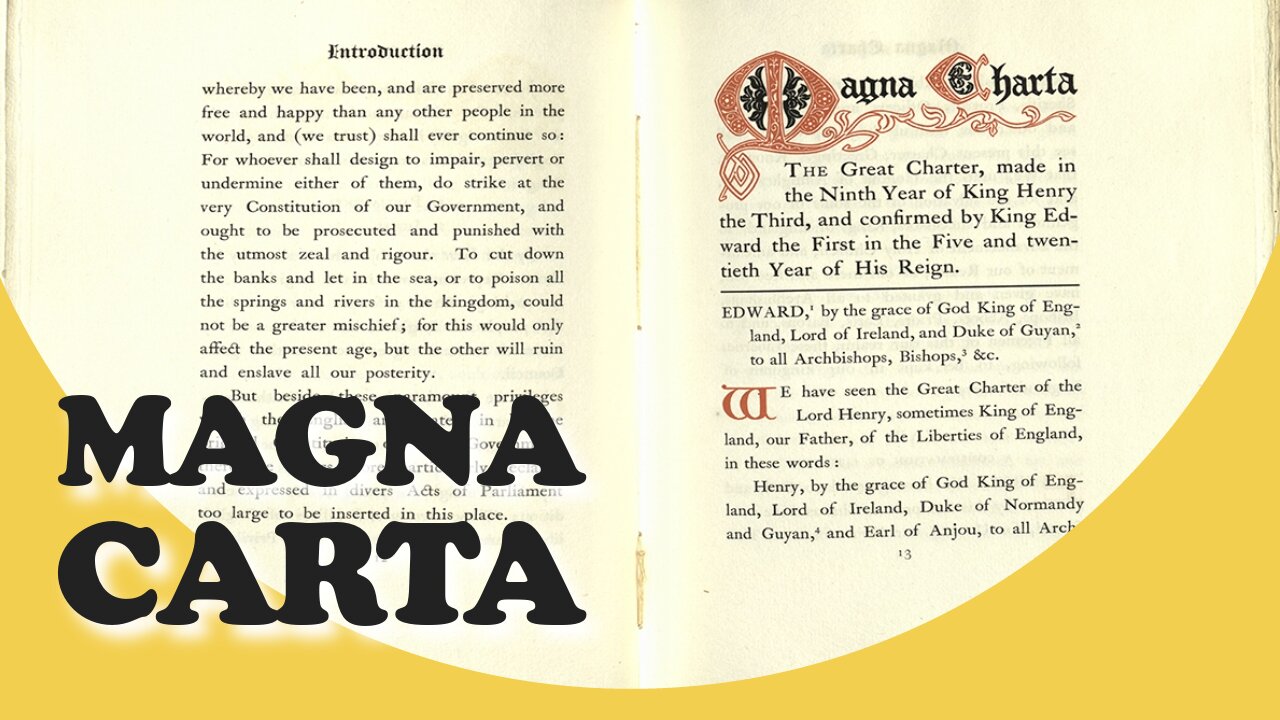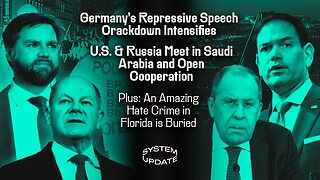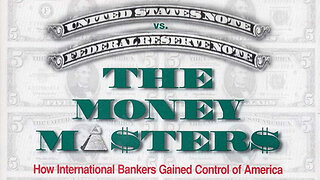Premium Only Content

Magna Carta: The Medieval Roots of Modern Democracy
Magna Carta, also known as the Great Charter, serves as a foundational cornerstone of modern democracy and the rule of law. Made on June 15, 1215, in a meadow at Runnymede, England, it represents a pivotal moment in the struggle for individual liberties and limitations on absolute monarchical power.
The early 13th century was a tumultuous time in England. King John, infamous for his oppressive and arbitrary rule, faced mounting discontent among his barons, clergy, and subjects. His reign was marked by exorbitant taxation, military failures, his abuse of the legal system, and his interference with the Church. By 1215, a group of rebellious barons demanded relief from the king's tyranny. It was in this backdrop of political unrest that Magna Carta was born.
Magna Carta was not a declaration of universal human rights, but rather a practical and specific attempt to address the grievances of the barons and limit the authority of the king. It outlined a set of promises and rights and primarily focused on taxation, feudal obligations, and the administration of justice.
The Charter contained 63 clauses, each addressing a particular grievance or demand. Some clauses were concerned with smaller matters, such as fishing rights on the River Thames. However, other clauses laid the foundation for principles that would become central to the development of constitutional law.
Key Principles of Magna Carta include:
Rule of Law: Magna Carta established the principle that no one, not even the king, is above the law.
Due Process: The Charter ensured that individuals could not be arbitrarily punished or deprived of their rights.
Taxation with Consent: One of the central concerns of the barons was excessive taxation. Magna Carta required that any new taxes or levies must be approved by a council of nobles, known as the Great Council. This principle laid the groundwork for modern concepts of representative government and taxation with representation.
Protection of Widows and Heirs: The Charter included provisions to protect the inheritance rights of widows and heirs.
Freedom of the Church: Magna Carta asserted that the English Church should be free from royal interference.
Habeas Corpus: Although not explicitly mentioned in Magna Carta, the principle of habeas corpus, which ensures that individuals cannot be held in detention without a legal basis, traces back to this document.
Magna Carta was not an instant remedy to the grievances of the barons or the broader issues of governance in medieval England. King John, after reluctantly sealing the Charter, sought papal annulment, plunging the country into civil war. However, Magna Carta's principles gained greater significance over time.
During the reign of John's son, King Henry III, and subsequent monarchs, Magna Carta was reissued and reconfirmed multiple times and it was expanded and modified to address contemporary concerns. By the late 13th century, it had evolved from a baronial charter into a symbol of broader legal and political principles.
One of the most pivotal moments in Magna Carta's evolution came in 1297 when King Edward I issued a version known as the "Confirmatio Cartarum" (Confirmation of the Charters). This made the document applicable to all free men in the kingdom, not just the barons. It solidified the idea that the king's authority was limited by law and that the rights and liberties enshrined in the Charter were not the exclusive preserve of the aristocracy.
Magna Carta also had a profound impact beyond England. It was a model for the development of constitutional and legal principles in other nations, including Scotland, where the "Declaration of Arbroath" in 1320 drew inspiration from the Charter. In the American colonies, Magna Carta's legacy played a significant role in shaping the concept of individual rights and the resistance to British colonial rule. The famous phrase "No taxation without representation" echoes the Charter's provisions on taxation and consent.
Magna Carta influenced the development of legal systems around the world. Many see it as a precursor to modern constitutionalism, the Bill of Rights, and the Universal Declaration of Human Rights. Its principles have left an indelible mark on the development of democratic societies and the protection of human rights.
Magna Carta transcended its historical context to become a symbol of liberty and justice for all. The document stands for the power of collective action against tyranny and the enduring quest for justice, fairness, and the rule of law.
Photo credits - Basher Eyre, Michael Garlick, Richard Croft, Adrian S Pye, Christine Matthews, Yale Law Library, David Dixon, Philip Halling, Karen Vernon, Tony Hisgett, FDR Presidential Library & Museum, Rasiel Suarez, Artists' Suffrage League @ wikicommons
Music theme - Trumpets in Your Ears by Wowa & Chris Rede @unminus.com
-
 1:29:31
1:29:31
Glenn Greenwald
10 hours agoGermany's Repressive Speech Crackdown Intensifies; U.S. & Russia Meet in Saudi Arabia and Open Cooperation; Plus: An Amazing Hate Crime in Florida is Buried | SYSTEM UPDATE #408
95.8K57 -

DLDAfterDark
4 hours ago $1.32 earnedDLD Live! What's Your Typical EDC/Civilian Load Out? Guns & Ammo & EDC?
17.8K1 -
 1:30:48
1:30:48
Redacted News
11 hours agoBREAKING! TRUMP AND PUTIN NEARING PEACE BUT EUROPEAN WARMONGERS TRYING TO STOP IT | REDACTED
190K249 -
 52:40
52:40
Candace Show Podcast
11 hours agoSaturday Night Lively: What Were They Thinking? | Candace Ep 148
158K152 -
 3:30:06
3:30:06
Man in America
6 hours agoDocumentary: The Money Masters 'How International Bankers Gained Control of America'
47.3K11 -
 1:10:40
1:10:40
PMG
1 day ago $2.26 earnedTom Hanks Plays a Racist MAGA Supporter On SNL!! UNBELIEVABLE
22.6K3 -
 2:11:29
2:11:29
Adam Does Movies
10 hours ago $1.72 earnedAsk Me Anything - Live!
29.8K1 -
 56:18
56:18
Flyover Conservatives
1 day agoFollow the Money: $4.7 Trillion in Government Fraud EXPOSED!; Flu Shots, Fear & Big Pharma Lies—What They DON’T Want You to Know - Dr. Stella Immanuel | FOC Show
34.9K1 -
 1:16:24
1:16:24
Anthony Rogers
1 day agoEpisode 354 - Current Events, Weather, and Other Clickbait
36.2K2 -
 25:10
25:10
Producer Michael
10 hours agoTHE HOTTEST FRAGRANCES FOR 2025!
35.1K2